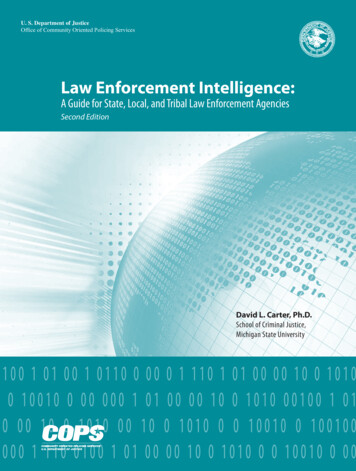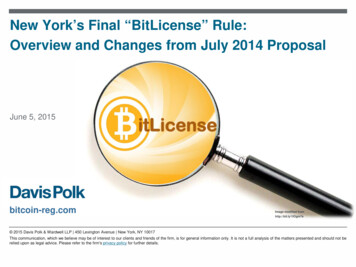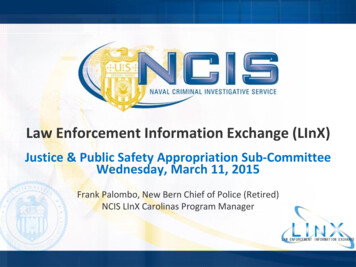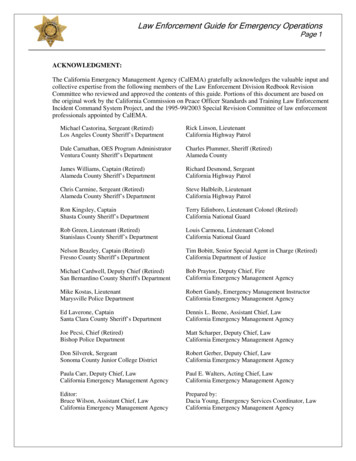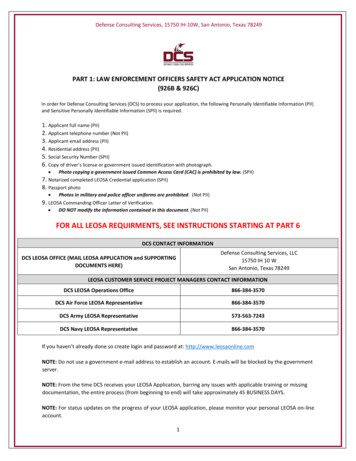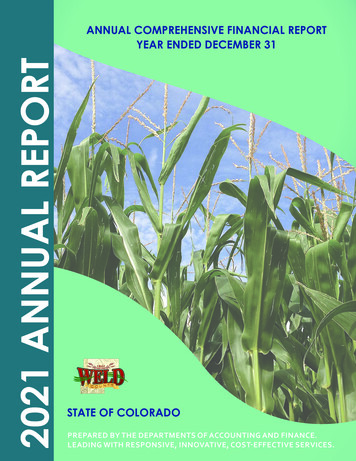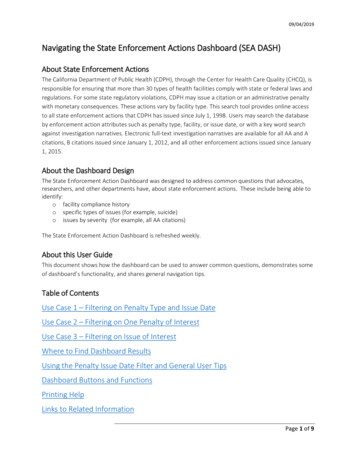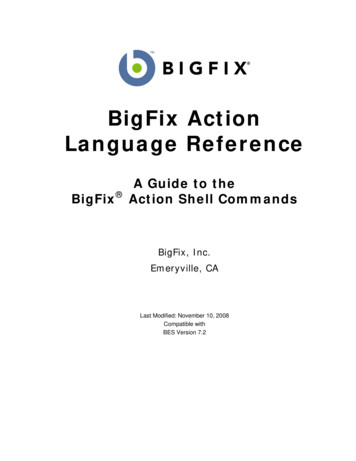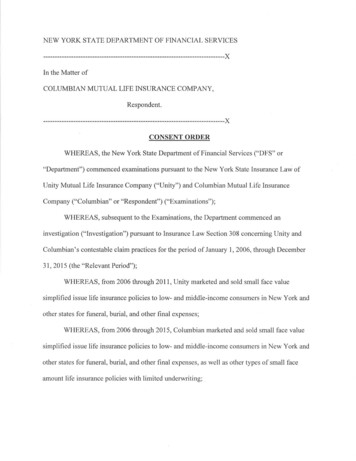
Transcription
NEW YORK STATE DEPARTMENT OF FINANCIAL ------------------------------------)(In the Matter ofCOLUMBIAN MUTUAL LIFE INSURANCE SENT ORDERWHEREAS, the New York State Department of Financial Services ("DFS" or"Department") commenced examinations pursuant to the New York State Insurance Law ofUnity Mutual Life Insurance Company ("Unity") and Columbian Mutual Life InsuranceCompany ("Columbian" or "Respondent") ("Examinations");WHEREAS, subsequent to the Examinations, the Department commenced aninvestigation ("Investigation") pursuant to Insurance Law Section 308 concerning Unity andColumbian' s contestable claim practices for the period of January 1, 2006, through December31, 2015 (the "Relevant Period");WHEREAS, from 2006 through 2011, Unity marketed and sold small face valuesimplified issue life insurance policies to low- and middle-income consumers in New York andother states for funeral, burial, and other final expenses;WHEREAS, from 2006 through 2015, Columbian marketed and sold small face valuesimplified issue life insurance policies to low- and middle-income consumers in New York andother states for funeral, burial, and other final expenses, as well as other types of small faceamount life insurance policies with limited underwriting;
WHEREAS, the Department concluded that Unity and Columbian improperly deniedcoverage and unilaterally rescinded policies when policyholders died within the two-yearcontestable period without proving in an action a misrepresentation by the policyholder on theapplication for insurance as required by the Insurance Law;WHEREAS, the Department further concluded that Unity and Columbian engaged inunfair claims settlement practices in violation of the New York Insurance Law by improperlymisrepresenting facts and policy provisions relating to coverage and not attempting in good faithto effectuate prompt, fair, and equitable settlements of submitted claims in which liability hadbecome reasonably clear;WHEREAS, the Department further concluded that Unity and Columbian violatedInsurance Department Regulations by failing to refer in writing to a specific policy provision,condition, or exclusion in a policy that was the basis for denying a claim, or by not providing aspecific reason for disclaiming coverage;NOW, THEREFORE, the Department and Respondent are willing to resolve the matterscited herein in lieu of proceeding by notice and a hearing.FINDINGSThe findings of the Examinations and Investigation are as follows:Relevant entities1. Unity was organized as a fraternal benefit society in 1903 and commenced businessin 1905. It was converted to a mutual life company in 1957 and adopted the name Unity MutualLife Insurance Company in 1972. Its headquarters were in Syracuse, New York.2. Columbian was incorporated as a charitable and benevolent association in New Yorkunder the name American Protective Association in 1882; in 1883, it obtained its license and2
commenced business. In 1952, it converted to a mutual life insurance company and adopted thename Columbian Mutual Life Insurance Company. It is headquartered in Binghamton, NewYork.3. On July 1, 2011, Columbian acquired Unity.Terms4. For purposes of this Consent Order, the following terms shall have the meanings asset forth herein:a. "Final expense product" is a life insurance product with a death benefitintended to cover burial and other expenses associated with bereavement.Final expense products often have little or even no underwriting.b. "Contestable period" means the period of two years dating from a policy'sdate of issue or from the effective date of certain increases or changes to thepolicy, after which time a life insurance policy in force during the life of thepolicyholder becomes incontestable.c. "Contestable claim" is a life insurance claim made during the two-yearcontestable period.Background5. Unity marketed its final expense product in New York State from 2003 through 2007and thereafter from April 2008 until the Columbian acquisition in 2011.6. Though it offered other products, Unity's primary product throughout the RelevantPeriod prior to its merger with Columbian was its final expense product.3
7. Columbian is authorized to write life insurance, annuities, and accident and healthinsurance in New York State. New York State is Columbian's largest market in its life insurancebusiness.8. Columbian continues to sell final expense products which, in general, provide a deathbenefit of 2,500 to 10,000, as well as other types of small face amount life insurance policieswith limited underwriting.Unity Findings9. The Department oflnsurance 1 conducted a market conduct examination of Unitycovering the period of January 1, 2006, through December 31, 2008 (the "Unity Examination").10. As part of its review, during the Unity Examination the Department evaluated asample of various types of claims. The Unity Examination also reviewed surrenders, charges,and lapsed policies, including a number of claims that were closed without payment.11. A review of a sample of claims closed without payment showed that Unity did notadvise the individual notifying the company of the policyholder's death or the beneficiary inwriting that the claim was being closed without payment or was denied. Unity closed the claimon its claims administration system and no communication was made with the informant orbeneficiary.12. For claims in which the policyholder's death was reported by someone other than abeneficiary, the Unity Examination's review of records found no evidence that Unity personnelmade a good faith attempt to locate the beneficiary or beneficiaries, either through a creditreporting agency or other means.1On October 3, 2011, the Insurance Department merged with the Banking Depa11ment to create the New York StateDepai1ment of Financial Services.4
13. In 9 out of 29 sample claims reviewed that were closed without payment, the claimwas filed within the policy's contestable period.14. When policyholders died during the contestable period, Unity requested medicalrecords. Unity closed these contestable claims without payment if it did not receive thepolicyholder's medical records upon demand to the beneficiary. There was no affirmativeevidence in the 9 instances that the policyholder made material misrepresentations on theapplication for insurance, or that there was a breach of policy provisions.15. In this sample of 9 contestable claims, beneficiaries provided the required proofs ofdeath, including a certified death certificate.16. The Unity Examination found that it was Unity's practice to close claims withoutpayment if either a death certificate or medical records were not provided.17. During the period covered by the Unity Examination, Unity did not providebeneficiaries any notice of its decision to close such claims and did not inform beneficiaries ofany specific policy provision, condition, or exclusion in the policy that were the grounds of thedenial, or cite any specific reason for disclaiming coverage.18. When Unity closed such claims, although a claim for a death benefit had been madeand there was some evidence that the policyholder died, Unity placed the policies back in activestatus and allowed them to lapse with no value. Naturally, these policies lapsed because the partyresponsible for premium payments-the policyholder-was deceased.19. The Department found that Unity also unilaterally rescinded some policies if, afterreceiving medical records, it concluded that claims filed within the contestable period containedmaterial misrepresentations. These determinations were made by the company only and not by acomi in an action to rescind.5
Columbian in dings20. During the Relevant Period, Columbian routinely requested medical records from adeceased policyholder's beneficiary or beneficiaries if the death occurred within the contestableperiod.21. If medical records were not produced, Columbian refused to pay the face amount ofthe policy. Instead, Columbian unilaterally rescinded the deceased's policy, notified thebeneficiary or beneficiaries that the policy was rescinded because of the failure to providemedical records as requested, and returned the premiums to the beneficiary or beneficiaries.22. During the Relevant Period, Columbian also unilaterally rescinded claims when itreceived medical records and concluded that the deceased made a material misrepresentation.Columbian did not obtain these rescissions through a court action. Upon rescission, Columbianreturned the policyholder's premiums to his or her beneficiary or beneficiaries.New York contestable claims23. During the Relevant Period, Unity had 60 contestable claims with a face amounttotaling 361,962 in New York State in which the claims were closed without payment orremained pending because Unity did not receive a death certificate or medical records. In 2010and 2011, Unity returned 1,872 in premiums to beneficiaries for 6 of these contestable claims.24. Starting in 2010, Unity also unilaterally rescinded 35 contestable claims with a faceamount totaling 300,620 based on alleged material misrepresentations. During the RelevantPeriod, Unity returned 25,465 in premiums to beneficiaries for these claims.25. During the Relevant Period, Columbian had 123 contestable claims in New YorkState with a face value totaling 1, 106,642 where Columbian closed claims or unilaterallyrescinded policies because it did not receive a death certificate or medical records.6
26. Columbian also unilaterally rescinded 39 contestable claims with a face amount of 322,699 based on alleged material misrepresentation.27. During the Relevant Period, Columbian paid 70,447 in returned premiums toclaimants in connection with 123 of the 162 contestable claims that it rescinded.28. The face amount of Unity's and Columbian's 257 contestable claims is 2,091,923 .Relevant statutes, regulations, and New York case law29. Pursuant to Insurance Law Section 3203(a)(3), life insurance policies areincontestable after being in force during the life of the insured for a period of two years from itsdate of issue or, as to certain increases in the death benefit or changes in other policy provisions,from the effective date of those increases or changes. Pursuant to Insurance Law Sections3203(a)(3), 3105(a), and 3105(b)(l), within the two-year contestable period, an insurer may onlycontest a covered claim on the basis of a misrepresentation if the insurer proves a materialmisrepresentation by the insured on the application for insurance.30. Insurance Law Section 3105(a) provides that a misrepresentation is a false statementby an applicant concerning past or present fact made to the insurer at or before the making of theinsurance contract as an inducement to make the contract, such as a false statement that theapplicant has not had a particular disease, ailment, or medical impairment.31. Under Insurance Law Section 3105(b ), a misrepresentation will not avoid or defeatrecovery under any insurance policy unless the misrepresentation was material. Amisrepresentation is material if knowledge by the insurer of the facts misrepresented would haveled to the insurer's refusal to make the contract.32. Insurance Law Section 3105(d) provides: "If in any action to rescind any such[insurance] contract or to recover thereon, any such misrepresentation is proved by the insurer,7
and the insured or any other person having or claiming a right under such contract shall preventfull disclosure and proof of the nature of such medical impairment, such misrepresentation shallbe presumed to have been material."33. Under relevant New York jurisprudence, if there is a change in the status quo, such asthe death of the insured, then an insurer must obtain rescission through a judicial determinationor by all beneficiaries agreeing to rescission after being made aware of their rights to contest therescission claim in an action.34. Pursuant to Insurance Law Section 2601(a)(l), (2), and (4), it is an unfair claimsettlement practice for an insurer to commit the following acts without just cause and with suchfrequency to indicate a general business practice:a.Knowingly misrepresenting to claimants pertinent facts and policyprovisions relating to coverages at issue;b.Failing to acknowledge with reasonable promptness pertinentcommunications regarding claims arising under its policies; andc.Not attempting in good fair to effectuate prompt, fair, and equitablesettlement of claims submitted in which liability has become reasonablyclear.35. Pursuant to Department Regulation No. 64, 11 N.Y.C.R.R. Section 216.3(b), noinsurer shall deny any element of a claim on the grounds of a specific policy provision,condition, or exclusion unless reference to such provision, condition, or exclusion is made inwriting to the insured, beneficiary, or claimant.36. Also pursuant to Department Regulation No. 64, 11 N.Y.C.R.R. Section 216.6(d), aninsurer shall inform the claimant in writing as soon as it is determined that there was no policy in8
force or that the insurer is disclaiming liability because of a breach of policy provisions by thepolicyholder. The insurer must also explain its specific reasons for disclaiming coverage.Violations37. The Department finds that Respondent violated Insurance Law Section 2601(a)(l),(2), and (4) by misrepresenting facts and policy provisions relating to coverage, failing toacknowledge with reasonable promptness pertinent communications as to claims arising underits policies, and failing to attempt in good faith to effectuate prompt, fair, and equitablesettlements of claims submitted in which liability had become reasonably clear.38. The Department finds that Respondent violated Sections 216.3(b) and 216.6(d) ofDepartment Regulation No. 64 by failing to refer in writing to a specific policy provision,condition, or exclusion in the policy that was the ground for denial of a claim, or by failing toprovide a specific reason for disclaiming coverage.AGREEMENTIT IS HEREBY UNDERSTOOD AND AGREED by Respondent, and allsubsidiaries, affiliates, successors, assigns, agents, representatives, employees, andsubcontractors, that:Cease and desist39. Respondent shall cease and desist the practices found by the Department to haveviolated the Insurance Law and Regulations.Other injunctive terms40. In order to comply with the requirements of Insurance Law Sections 260 I, 3105, and3203, Respondent shall adopt the following practices with respect to payment and investigationof contestable claims:9
a.If Respondent has evidence or notice of an insured' s death, it shall notlapse the insured's policy for non-payment of premiums.b.Respondent, not beneficiaries or a policyholder's estate, bears the burdenof investigating claims submitted within the contestable period;c.In investigating claims submitted within the contestable period,Respondent may request a death certificate but will also accept alternativesatisfactory proof of loss if a death certificate cannot be obtained.d.Respondent may only contest a contestable claim on evidence of amaterial misrepresentation by the insured on the application for insurance,as provided in Insurance Law Sections 3105(a) and 3105(b)(l);e.The materiality of a misrepresentation shall be whether, had theRespondent known the facts misrepresented, it would have refused tomake such contract, as provided in Insurance Law Section 3105(b )(1 );f.A presumption of materiality of a misrepresentation shall arise in an actionto rescind or defeat recovery, as provided in Insurance Law Section3105(d);g.If a contestable claim is incurred and there has been a change in the statusquo, Respondent shall only obtain a rescission of the policy by prevailingin a court action or by all beneficiaries agreeing to rescission after beingmade aware of their rights to contest the rescission claim in an action.Restitution41. For all identified contestable claims that Unity or Columbian closed without paymentor unilaterally rescinded, Respondent shall pay the face amount of each such policy plus interest10
dating from the date of death to the date of such payment, unless the Third Party Administratordescribed in paragraph 43 determines, based upon a review of the claim, that the insured made amaterial misrepresentation in his or her application for such policy, as provided in Insurance LawSection 3105.42. Any payments described in paragraph 41 shall be reduced by any amounts alreadypaid by Respondent to beneficiaries as premium refunds for rescinded policies.Third party administrator43. As soon as practicable, but no later than sixty days from the execution of this ConsentOrder, DFS shall select an independent third party administrator ("TP A") to review andadminister the contestable claims review and restitution process, as provided in paragraphs 41and 42 of this Consent Order. Respondent will retain the TPA after the Department's review andapproval of the retainer agreement. Respondent shall be fully and solely responsible for allproper fees, expenses, and disbursements of the TP A in connection with the review andrestitution process provided for in this Consent Order and the TPA's retainer agreement.44. The TP A shall, as part of its operations, establish and maintain throughout theduration of its obligations pursuant to this Consent Order, multiple cost-free means for affectedbeneficiaries to contact it, including an electronic mail address, a website, and a toll-freetelephone number.45. Within thirty days after retention of the TP A, Respondent shall provide the TP A forits review all information in their possession, custody, or control, including but not limited topolicy records and complete claims files, for all identified claims made within the contestableperiod for New York policies.11
46. The TP A may request from Respondent any information and data it reasonablybelieves it will need to fulfill its obligations under this Consent Order, and Respondent shallprovide the requested information and data within seven days of receiving such a request fromthe TPA.47. The TP A shall determine, according to the provisions and standards set forth in itsretainer agreement, the following:a.Which identified contestable claims were lawfully closed without paymentas noted above; andb.Which identified contestable claims were unlawfully closed withoutpayment as noted above.48. For claims that Respondent unlawfully closed without payment as described inparagraph 47, the TPA shall determine the death benefit to be paid according to the policy. Ifrecords for contestable claims unlawfully closed without payment are incomplete and it is notknown whether payment was made, the claims shall be paid according to the policy. Benefitsshall be reduced by any amounts already paid by Respondent to beneficiaries, and shall includeinterest as required by Insurance Law Section 3214(c).49. The TP A shall also identify and locate the beneficiaries of all identified contestableclaims Respondent unlawfully closed without payment.50. Within thirty days of the TPA's final determination of all amounts owed to affectedbeneficiaries, Respondent shall wire-transfer to the TP A the total amount owed by Respondent tothe beneficiaries.51. Within thirty days of receiving the wire-transfer described in paragraph 50, the TPAshall deposit in the facilities of the U.S. Post Office, for delivery by prepaid first-class mail to12
each beneficiary to whom Respondent owes payment, a check in the required amount payable tothe individual beneficiary. All checks must be valid for six months. Such payment shall beaccompanied by a letter from the Department, in the form annexed hereto as Exhibit A.52. For any payment to a beneficiary that is returned to the TPA as undeliverable or notdeposited within six months, the TPA shall conduct a reasonable search, as provided in itsretainer agreement, for a current address. The TPA may cancel checks not deposited within sixmonths. Should the search show a more current address, the TP A shall re-issue a check valid forsix months in the amount of the returned or un-deposited check and send the reissued check tothe more current address within fifteen days in the manner provided in paragraph 51. After doingso, no further action shall be required by the TP A to complete the mailing process.53. In the event that a beneficiary does not cash his or her check before the expirationdate of the check or the check was returned after the TP A re-posts the check as described inparagraph 52, the TPA shall follow all applicable provisions of the New York AbandonedProperty Law, including all reporting, mailing, and remittance requirements.54. The TPA shall provide reports to the Department as provided in the retaineragreement to confirm compliance with this Consent Order.55. The TPA's obligations under this Consent Order are satisfied when the processdescribed in paragraphs 47 through 54 is completed.Monetary penalty56. Respondent shall pay a civil penalty of two hundred fifty-seven thousand dollars( 257,000) to DFS within ten,days of the Effective Date. The payment shall be in the form of awire transfer in accordance with instructions provided by DFS.13
57. Respondent agrees that it will not claim, assert, or apply for a tax deduction or taxcredit with regard to any U.S. federal, state, or local tax, directly or indirectly, for any portion ofthe civil monetary penalty paid pursuant to this Consent Order.Other relief58. Respondent submits to the authority of the Department to effectuate this ConsentOrder.59. Respondent will cease and desist from engaging in any acts in violation of the NewYork Insurance Law and will comply with this and every other New York law.60. Respondent may not bring any claim, action, or proceeding against the TP A.61. Respondent represents and warrants, through the signatures below, that the terms andconditions of this Consent Order are duly approved, and execution of this Consent Order is dulyauthorized.Breach of the consent order62. In the event that the Department believes Respondent to be materially in breach of theConsent Order ("Breach"), DFS will provide written notice to Respondent of the Breach andRespondent must, within ten business days from the date of receipt of said notice, or on a laterdate if so determined in the sole discretion of the Department, appear before DFS and shall havean opportunity to rebut the evidence, if any, of DFS that a Breach has occurred and, to the extentpertinent, to demonstrate that any such Breach is not material or has been cured.63. The Respondent understands and agrees that Respondent's failure to appear beforethe Department to make the required demonstration within the specified period as set forth inparagraph 62 is presumptive evidence of Respondent's Breach. Upon a finding of Breach, DFShas all the remedies available to it under the New York Insurance Law, Financial Services Law,14
or other applicable laws and may use any and all evidence available to DFS for all ensuinghearings, notices, orders, and other remedies that may be available under the New YorkInsurance Law, Financial Services Law, or other applicable laws.Other prnvi ·ions64. If Respondent defaults on any of its obligations under this Consent Order, DFS mayterminate this Consent Order, at its sole discretion, upon ten days' written notice to Respondent.In the event of such termination, Respondent expressly agrees and acknowledges that thisConsent Order shall in no way bar or otherwise preclude the Department from commencing,conducting, or prosecuting any investigation, action, or proceeding, however denominated,related to the Consent Order, against them, or from using in any way statements, documents, orother materials produced or provided by Respondents prior to or after the date of this ConsentOrder, including, without limitation, such statements, documents, or other materials, if any,provided for purposes of settlement negotiations.65. The Department has agreed to the terms of this Consent Order based on, among otherthings, the representations made to the Department by Respondent and its counsel and DFS'sown Examinations and Investigation. To the extent that representations made by Respondent orits counsel are later found to be materially incomplete or inaccurate, this Consent Order orcertain provisions thereof are voidable by the Department in its sole discretion.66. All notices, reports, requests, certifications, and other communications to any partypursuant to this Consent Order shall be in writing and shall be directed as follows:Ifto DFS:New York Depai1ment of Financial ServicesOne State StreetNew York, New York 10004-1511Attention: Anna Maccormack, Assistant Counsel15
If to Respondent:Columbian Mutual Life Insurance Company4704 Vestal Parkway EastP.O. Box 1381Binghamton, New York 13902-2472Attention: Frank L. Lettera, Esq.with a copy to :Debevoise & Plimpton LLP919 Third A venueNew York, New York 10022Attention: Eric R. Dinallo, Esq.67. This Consent Order and any dispute thereunder shall be governed by the laws of theState of New York without regard to any conflicts of laws principles.68. Respondent waives its right to further notice and hearing in this matter as to anyallegations of past violations up to and including the Effective Date and agree that no provisionof the Consent Order is subject to review in any court or tribunal outside the Department.69. This Consent Order may not be amended except by an instrument in writing signedon behalf of all the parties to this Consent Order.70. This Consent Order constitutes the entire agreement between the Department andRespondent and supersedes any prior communication, understanding, or agreement, whetherwritten or oral, concerning the subject matter of this Consent Order. No inducement, promise,understanding, condition, or warranty not set forth in this Consent Order has been relied upon byany party to this Consent Order.71. In the event that one or more provisions contained in this Consent Order shall for anyreason be held invalid, illegal, or unenforceable in any respect, such invalidity, illegality, orunenforceability shall not affect any other provisions of this Consent Order.16
72. Upon execution by the parties to this Consent Order, the Department will discontinuethe Investigation as and against Respondent solely with respect to the identified contestableclaims. No further action will be taken by the Department against Respondent for the conductwith respect to the contestable claims identified found to have violated the Insurance Law andRegulations as set forth in the Consent Order provided that Respondent complies fully with theterms of the Consent Order.73. This Consent Order may be executed in one or more counterparts, and shall becomeeffective when such counterparts have been signed by each of the parties hereto and the ConsentOrder is So Ordered by the Superintendent of Financial Services or her designee ("EffectiveDate").17
WHEREFORE, the signatures evidenoing assent to this Consent Order have been affixedhereto on the dates set forth below.NEW YORK STATE DEPARTMENT OF FINANCIAL SERVICESBy: --/; J Executive Deputy SuperintendentFinancial Frauds & Corurumer Protection DivisionDecember I . 2016COLUMBIAN MUTUAL LIFE INSURANCE COMPANYBy:4-A d r2wa?DecemberJ!t, 2016THE FOREGOING IS HEREBY APPROVED.IT IS SO ORDERED.Dated: New York, New YorkDecembero2/ , 2016L)tjfa-(1?v1ARIA T. VULLOSuperintendent of Financial Services18
[Date][Beneficiary's Address]Dear [Beneficiary],You are receiving this notice pursuant to a settlement reached between ColumbianMutual Life Insurance Company ("Columbian") and the New York State Department ofFinancial Services. The settlement concerns the contestable claims practices of Columbian andanother company, Unity Mutual Life Insurance Company, which Columbian acquired in 2011.Records indicate that you are the beneficiary of a policy, [Columbian/Unity Policy####],that is affected by this settlement. We write to notify you that, pursuant to the settlement with theNew York State Department of Financial Services, Columbian is paying the face amount of thispolicy, plus interest dating from the policyholder's date of death. This amount may be reducedby amounts already paid as premium refunds for improperly rescinded policies.This settlement was obtained by the New York State Department of Financial Services.Nothing in the settlement prevents or limits you from pursuing any right or remedy at law youmay have or requires you to release any rights.If you have any further problems regarding Policy [###], or if you have questionsconcerning this settlement or any refund provided, you can contact the New York StateDepartment of Financial Services at 1-800-342-3736 and at [email address to be provided], oryou may contact the Third Party Administrator, [name ofTPA], that is administering thissettlement at [toll-free number], [email address], or [website].Sincerely,19
commenced business. In 1952, it converted to a mutual life insurance company and adopted the . name Columbian Mutual Life Insurance Company. It . is headquartered in Binghamton, New York. 3. On July 1, 2011, Columbian acquired Unity. Terms 4. For purposes of this Consent Order, the following terms shall have the meanings as set forth herein: a.

